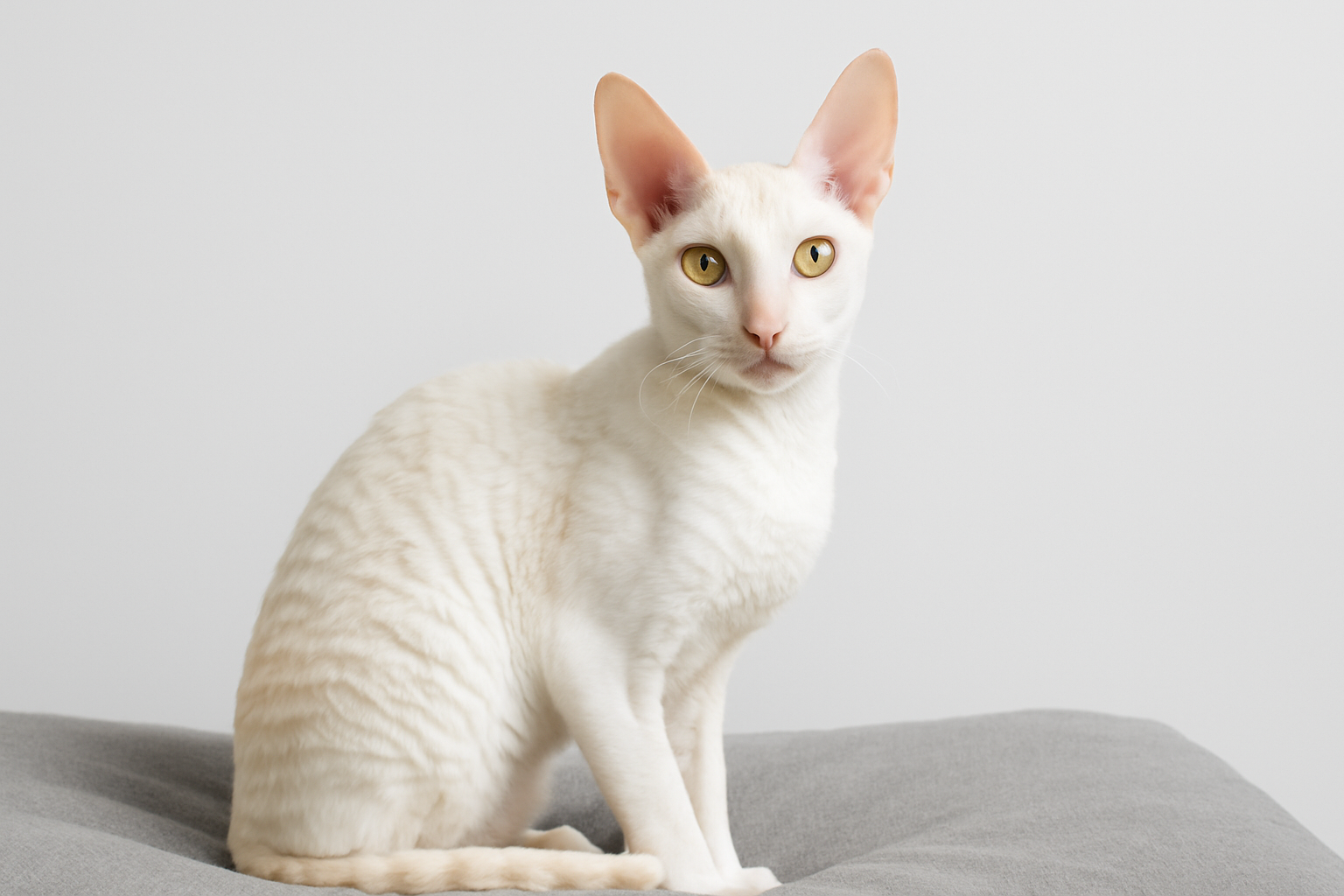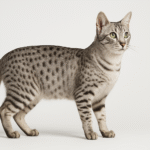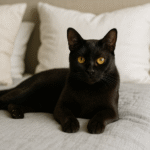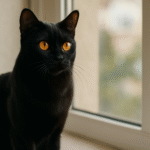The Cornish Rex Cat is instantly recognizable thanks to its short, curly coat and elegant, slender build. With oversized ears, big eyes, and a lively personality, this breed is often called the “greyhound of the cat world”—not just for its appearance, but also for its love of racing around the house.
If you’re looking for a playful, affectionate, and mischievous feline companion, the Cornish Rex might be the perfect match. Despite their refined look, these cats are silly entertainers who adore human attention.
Quick Breed Facts:
Origin: Cornwall, England
Breed registries: CFA, TICA, FIFe, GCCF
Weight range: 6–10 pounds
Lifespan: 11–15 years
Coat: Very short, soft, curly
Colors and patterns: Wide variety, including solid, tabby, bicolor, and more
Eye color: Varies (often gold, green, or hazel)
Grooming: Very low
Activity level: High
Affection level: Very affectionate
Vocality: Moderate to high
Good with children: Yes
Good with other pets: Yes
History & Origin
The first Cornish Rex kitten appeared in 1950 in Cornwall, England, born to a barn cat named Serena. One kitten in her litter, named Kallibunker, had an unusual curly coat caused by a spontaneous genetic mutation. Breeders quickly recognized the uniqueness of this trait and began selectively breeding Kallibunker with other cats (and even back to his mother) to preserve and expand the gene.
Eventually, the breed gained recognition in the UK and the United States, and today, Cornish Rex cats are celebrated for their wavy coats and energetic, clownish personalities.
Personality & Traits
The Cornish Rex is a fun-loving feline with a kitten-like personality that lasts into adulthood. These cats are known for being active, social, and curious. They thrive on attention and often follow their humans from room to room, eager to be involved in whatever’s going on.
Don’t be surprised if your Cornish Rex greets guests at the door, plays fetch, or climbs to the highest spot in your home. They’re smart, people-oriented, and love interactive play.
Family Compatibility
Cornish Rex cats make wonderful family companions. They’re affectionate and adaptable, often doing well with respectful children, other cats, and even dogs. Their playful nature and boundless energy make them a hit in busy households—but they can also do well in quiet homes as long as they get enough attention.
They’re not the type to be left alone all day—they crave interaction and are happiest when they can snuggle, play, and be part of the family action.
Activity & Play
Cornish Rex cats are full of bounce and always looking for something to chase, climb, or investigate. These curious felines have kitten-like energy that rarely fades with age, and they need plenty of outlets for that enthusiasm. If they’re not zooming down the hallway, they’re probably perched somewhere high, surveying their domain—or waiting to pounce.
To keep their minds and bodies engaged, offer a rotation of interactive toys like puzzle feeders, wand games, or anything that mimics prey. They also love to climb, so tall cat trees or wall-mounted shelves are great additions to their environment.
Health & Lifespan
Cornish Rex cats are generally healthy, but like all purebreds, they may be prone to a few genetic conditions. One concern is patellar luxation, a kneecap issue that can affect their movement. They may also be sensitive to cold temperatures due to their thin coat and lack of insulating undercoat.
Overall, with proper care, Cornish Rex cats can live 11–15 years or more. Regular vet visits and a balanced diet will help support their long-term well-being.
Grooming & Shedding
The Cornish Rex’s coat is its signature feature—short, soft, and wavy like crushed velvet. Unlike most cats, they lack guard hairs, which makes them feel especially smooth to the touch. They shed very little and are extremely low-maintenance when it comes to grooming.
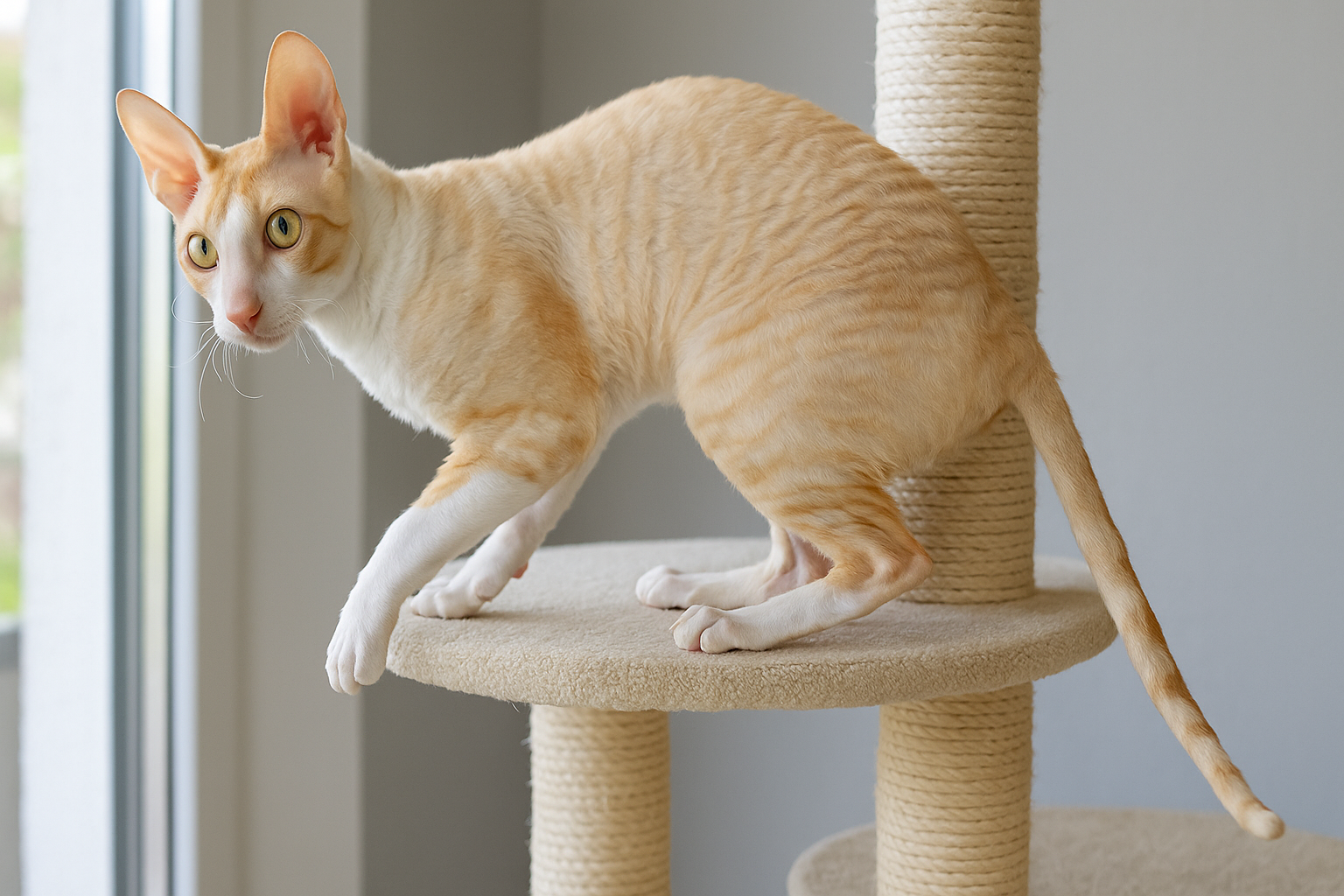
However, their skin can become oily, especially around the ears and paws, so an occasional gentle wipe with a damp cloth is helpful. They don’t need brushing—in fact, brushing can damage their delicate curls.
Nutrition & Feeding
Cornish Rex cats are always on the go, so they need a diet that keeps up with their high energy and fast metabolisms. A high-quality food rich in animal protein—like chicken, turkey, or fish—is a great foundation. These lean little athletes burn a lot of calories, so nutrient-dense meals help support strong muscles and all that playful activity.
Because they have such short coats and low body fat, they can feel the chill more than other cats. Look for foods with healthy fats like omega-3s to support skin health and help them stay cozy. A balanced diet with the right blend of protein, fat, and nutrients will keep your Cornish Rex feeling their best—inside and out.
Recommended Supplies
Cornish Rex cats may be lively and athletic, but they’re also snugglers at heart—especially when it’s chilly. Because their thin coat offers little insulation, they truly appreciate cozy spots where they can curl up and stay warm. A heated cat bed or soft, fleece-lined nook near a sunny window will quickly become a favorite nap zone.
Beyond warmth, these cats love vertical space. Tall cat trees, climbing shelves, or window perches give them a chance to leap, observe, and burn off some of that endless energy. And don’t forget interactive toys to help them stay mentally sharp. Rotate different toys each week to keep things fresh and fun.
Final Thoughts
The Cornish Rex may look like a delicate showpiece, but don’t be fooled—this cat is all personality. With their playful energy, affectionate nature, and unmistakable curly coat, Cornish Rex cats bring both joy and elegance into any home. They thrive on connection and fun, making them a perfect fit for anyone who wants an active, loving feline companion.
If you’re ready for a cat who acts like a kitten well into adulthood, craves human attention, and will happily take over your warmest blanket, the Cornish Rex might just steal your heart—and your spot on the couch.
Cornish Rex Cat FAQs
Are Cornish Rex cats hypoallergenic?
While no cat is truly hypoallergenic, many people with allergies find Cornish Rex cats more tolerable due to their minimal shedding and low dander levels.
Do Cornish Rex cats like to cuddle?
Yes! Cornish Rex cats are affectionate and love to curl up with their humans. They’re known for being heat-seekers and often snuggle under blankets or on laps.
Can Cornish Rex cats be left alone?
They can handle short periods alone, but they prefer companionship. If you’re away often, consider adopting a second pet to keep them company.
How much does a Cornish Rex cat cost?
Prices vary based on breeder reputation and location, but you can expect to pay between $800 and $1,500 for a Cornish Rex kitten from a reputable breeder.
Do Cornish Rex cats get cold easily?
Yes, their thin coat offers little insulation, so they may seek out warm spots in cooler months. Sweaters and heated beds can help keep them comfy.

